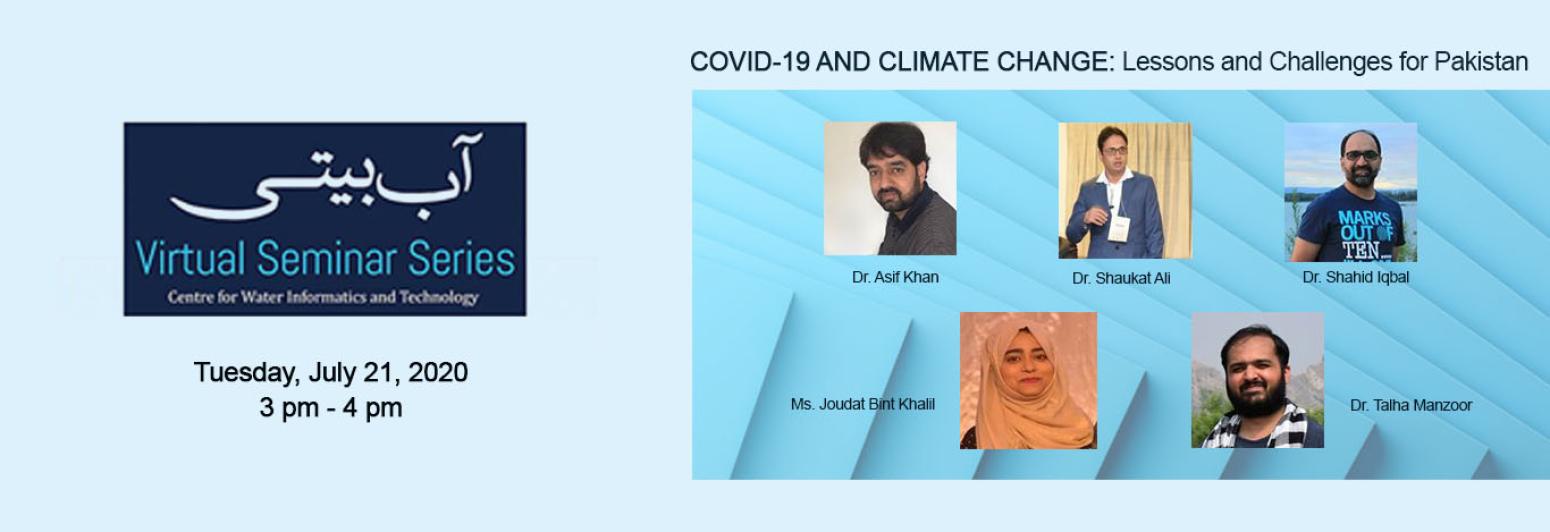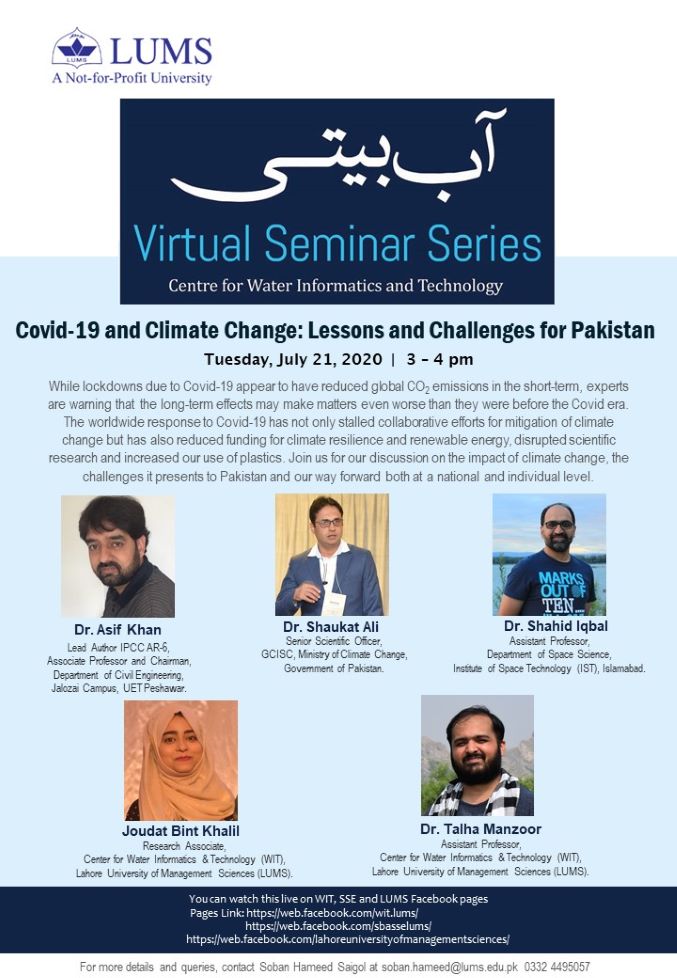
to
The Centre for Water Informatics and Technology (WIT), is organising a virtual seminar of آب بیتی, series. The seminar will include a conversation with the leading individuals in the field of climate change in Pakistan; Dr. Asif Khan, Dr. Shoukat Ali, Dr. Shahid Iqbal and Ms. Joudat Bint Khalil. The session will be moderated by Dr. Talha Manzoor, Assistant Professor at the Centre for Water Informatics and Technology (WIT), LUMS.
Date: Tuesday, July 21, 2020
Time: 3 pm - 4 pm
You can watch the session live on WIT, SBASSE and LUMS Facebook pages.
Profiles of Panelists
Dr. Asif Khan
Dr. Khan is currently working as Lead Author for IPCC AR-6, working as Water and Climate Change expert with ADB and other well-reputed organiations, Member for the Upper Indus Network, Member of Indus Basin Knowledge Forum, Member of Cambridge Philosophical Society, Member of British Hydrological Society, Member of European Geophysical Union, Member of American Geophysical Union, and a Member of several other international Forums. He also worked as Director Research at the Centre for Water Informatics and Technology, LUMS and Assistant Professor at UET Peshawar.
Dr. Khan has researched Water-Energy-Food Nexus under climate change for the Indus Basin during his Post-Doc at IIASA, Austria, and secured his PhD degree in the field of hydro-climatology from Cambridge University UK, where his research topic was ‘The hydro-climatology of the Upper Indus Basin: a critical analysis of data and modeling needs in a complex mountain environment’.
Dr. Khan also worked on different civil engineering projects, geotechnical investigations, water resources and its nexus research and climate change impact/adaptation assessment studies. He has produced 16 international journal publications and two book chapters related to the hydro-climatology of the Indus Basin. He has also been working as a reviewer in the field of hydro-climatology for more than 16 well-reputed international journals since 2012. Dr. Khan’s expertise are in snow-glacier hydro-climate modeling, MHVRA, CRVA, and Water Resources and Project Management. He wants to bridge research and industry to practice his professional and research skills in a better way.
Dr. Shaukat Ali
Dr. Ali has completed his PhD in Meteorology from the Institute of Atmospheric Physics (IAP), Chinese Academy of Sciences (CAS). Currently, He is working as Senior Scientific Officer in Global Change Impact Study Centre (GCISC), Ministry of Climate Change, Government of Pakistan. He is leading an APN awarded project ‘Towards robust projections of climate extremes and adaptation plans over South Asia: CRRP2018-04MY-Ali’. He also worked as a consultant as a part-time job at Asia Development Bank (ADB) in the Climate Risk and Vulnerability Assessment (CRVA) project.
Dr. Ali started his career as a lecturer in the University of Azad Jammu and Kashmir (UAJK) and then worked for the Pakistan Science Foundation, and Ministry of Information and Broadcasting, Islamabad, Pakistan. He has the honour of visiting as a research scholar in world reputed organisations e.g. 1. Abdus Salam International Centre for Theoretical Physics (ICTP), Trieste, Italy, 2. International Institute for Applied Systems Analysis (IIASA) - Vienna, Austria and 3. APEC Climate Center (APCC), Busan, Korea, 4. Integrated Research on Disaster Risk Reduction Division, National Research Institute for Earth Science and Disaster Resilience, Tsukuba, Japan. He has been involved in efforts to communicate scientific output to policymakers and the public by writing more than eight news articles on different climate change topics in leading newspapers. He has also computer application experience of Linux (Mandrake, SUSE, Redhat), Adobe PhotoShop, R, GrADs, Ferret, NCL and Climate Models.
Dr. Shahid Iqbal
Dr. Iqbal has more than ten years of professional field and research experience. At present he is working as Assistant Professor at Institute of Space Technology (IST) Islamabad, Visiting Faculty at UET Peshawar, Member of various international Forums, and working as Climate Change and Water Expert with NDRMF (National Disaster Risk Management Fund), Cameos, ADB, SUPARCO and few others.
Dr. Iqbal has carried out Climate Change impact assessment on water resources and hydroclimatic modelling for the Kabul River Basin under his Post-Doc and PhD at Wageningen
UR, the Netherlands, and his research topic was ‘The Impact of Socioeconomic and Climate Change on E. coli fate and transport in water resources in Kabul River Basin’.
Dr. Iqbal also worked on different hydrological projects, climate change investigations, water resources and climate change impact/adaptation assessment studies. He has produced several international journal publications and one book chapters related to the hydro-climatology of the Upper Indus Basin. He has also been working as a reviewer in the field of hydro-climatology for more than 6 well-reputed international journals.
Ms. Joudat Bint Khalil
Ms. Khalil is a Research Associate at the Centre for Water Informatics and Technology at LUMS. She is conducting research on assessing the spatio-temporal distribution of ozone over an agricultural field and potential impacts on crop yield. Prior to this, she acquired her Master’s degree in Electrical Engineering with a specialisation in Systems and Control from LUMS.
Dr. Talha Manzoor
Dr. Manzoor is currently serving as an Assistant Professor of Research at the LUMS Centre for Water Informatics and Technology (WIT) and also teaches in the Department of Electrical Engineering at LUMS.
He graduated in 2010 with a BS in Mechatronics Engineering from the National University of Science and Technology (NUST), Islamabad and subsequently joined LUMS where he completed his MS in Computer Engineering in 2013 and PhD in Electrical Engineering in 2017. He was part of a team that won first place in the National Instruments (NI) Mine Detection Robot Design Competition held in Beirut, Lebanon in 2011 and was awarded the gold medal in academics for both his BS and MS degrees. During his PhD he has spent time as a visiting researcher at the Advanced Systems Analysis program of the International Institute for Applied Systems Analysis (IIASA), Austria and the Robotics Research Lab at TU Kaiserslautern, Germany. After his PhD, he served for a couple of years as an Assistant Professor of Electrical Engineering at Namal Institute, Mianwali.
Dr. Manzoor’s work is focused on the modelling, control and estimation of complex dynamical systems. In his research, he works with such systems in the form of complex networks of human agents as consumers of natural resources, as opposed to the conventional treatment of human behaviour as disturbances, exogenous inputs or uncertainties. He employs research from social-psychology to form mathematical models of consumer behaviour. To analyse these models, he applies tools from Optimal Control, Game theory and Network Science to help pin down the characteristics of sustainable societies. He has also worked on control and estimation problems in robotics. This includes both theoretical and development work in Robotic Vision, SLAM and State Estimation.


